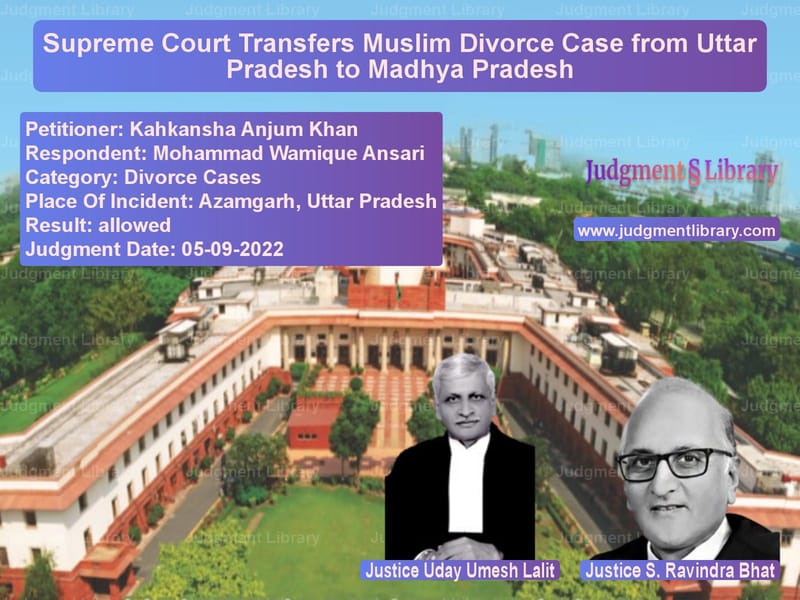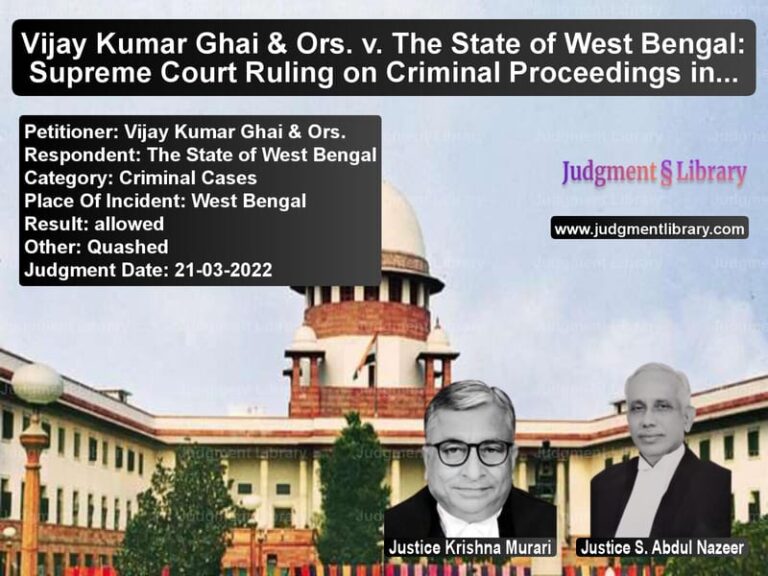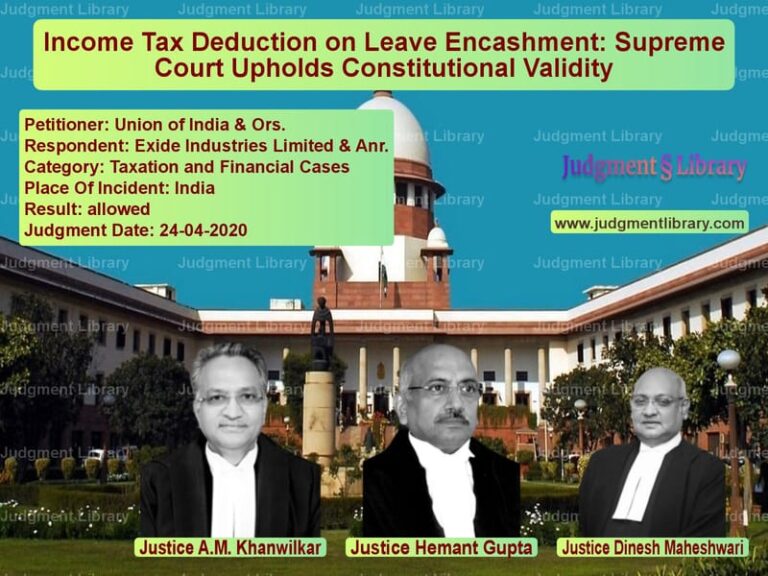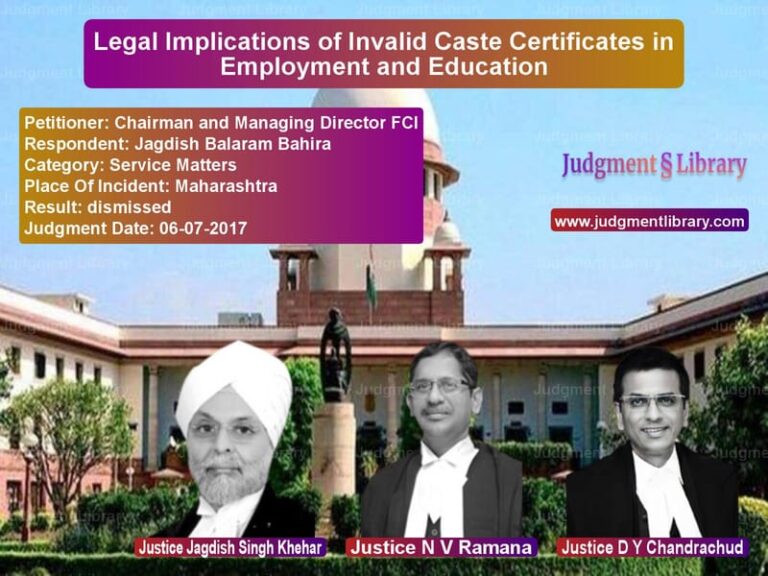Supreme Court Transfers Muslim Divorce Case from Uttar Pradesh to Madhya Pradesh
The Supreme Court of India recently ruled in the case of Kahkansha Anjum Khan vs. Mohammad Wamique Ansari, allowing the transfer of a Muslim divorce case from Azamgarh, Uttar Pradesh, to Jabalpur, Madhya Pradesh. The case was initially filed by the respondent-husband under Section 281 of Muslim Law in the Family Court at Azamgarh. However, the petitioner-wife sought its transfer to Jabalpur, citing convenience and legal grounds.
Background of the Case
The petitioner, Kahkansha Anjum Khan, approached the Supreme Court with a transfer petition seeking the relocation of the divorce proceedings initiated by her husband, Mohammad Wamique Ansari, from the Family Court in Azamgarh, Uttar Pradesh, to the Family Court in Jabalpur, Madhya Pradesh.
The petitioner argued that she would face significant difficulties in traveling to Azamgarh for the hearings and that shifting the case to Jabalpur would be in the interest of justice.
Legal Proceedings
Arguments by the Petitioner
- The petitioner contended that she was currently residing in Jabalpur and would face extreme hardship if required to attend proceedings in Azamgarh.
- She argued that she had no financial means to frequently travel to another state for legal hearings.
- She claimed that the respondent-husband had failed to enter an appearance before the Supreme Court despite being served a notice.
- She sought protection under the established legal principle that in matrimonial disputes, the convenience of the wife should be prioritized.
Arguments by the Respondent
- The respondent, Mohammad Wamique Ansari, did not appear before the Supreme Court or contest the transfer petition.
- No objections were raised against the wife’s plea for transferring the case to Jabalpur.
Supreme Court’s Observations
A bench comprising Chief Justice Uday Umesh Lalit and Justice S. Ravindra Bhat heard the case and made the following key observations:
1. Importance of the Wife’s Convenience in Matrimonial Cases
The Court reaffirmed its long-standing principle that in matrimonial disputes, the convenience of the wife should be given preference. It noted:
“It is a settled principle of law that in cases concerning marital discord, the wife’s convenience is of paramount consideration.”
2. Non-Appearance of the Respondent
The Court observed that the respondent had been duly served with a notice regarding the transfer petition but had chosen not to appear or oppose the request. The Court interpreted this as lack of objection on his part.
Read also: https://judgmentlibrary.com/supreme-court-upholds-wifes-convenience-in-matrimonial-case-transfers/
3. Ensuring Access to Justice
The Court recognized that requiring the petitioner to travel to Azamgarh would pose an unnecessary burden. It emphasized the need to facilitate access to justice by ensuring that parties can participate in legal proceedings without undue hardship.
Final Verdict
The Supreme Court ruled as follows:
- The transfer petition was allowed.
- The case pending before the Family Court in Azamgarh was ordered to be transferred to the Principal Judge, Family Court, Jabalpur, Madhya Pradesh.
- The Family Court in Azamgarh was directed to immediately transmit all records to the Family Court in Jabalpur.
- The Registry was instructed to send a copy of the order to both courts for compliance.
Impact of the Judgment
This ruling has significant implications for matrimonial cases, particularly in the following areas:
- It reinforces that women’s convenience is a key factor in determining the appropriate forum for matrimonial disputes.
- It ensures that legal proceedings do not create an undue financial or logistical burden on any party, particularly the wife.
- It highlights that non-appearance of a respondent may be interpreted as implied consent to the requested transfer.
Conclusion
The Supreme Court’s ruling in Kahkansha Anjum Khan vs. Mohammad Wamique Ansari is a crucial judgment that upholds the principle of ensuring fair access to justice in matrimonial disputes. By prioritizing the convenience of the wife, the Court has reinforced its commitment to safeguarding the rights of individuals in personal law cases.
Petitioner Name: Kahkansha Anjum Khan.Respondent Name: Mohammad Wamique Ansari.Judgment By: Justice Uday Umesh Lalit, Justice S. Ravindra Bhat.Place Of Incident: Azamgarh, Uttar Pradesh.Judgment Date: 05-09-2022.
Don’t miss out on the full details! Download the complete judgment in PDF format below and gain valuable insights instantly!
Download Judgment: kahkansha-anjum-khan-vs-mohammad-wamique-ans-supreme-court-of-india-judgment-dated-05-09-2022.pdf
Directly Download Judgment: Directly download this Judgment
See all petitions in Muslim Personal Law
See all petitions in Mutual Consent Divorce
See all petitions in Property Division in Divorce Cases
See all petitions in Judgment by Uday Umesh Lalit
See all petitions in Judgment by S Ravindra Bhat
See all petitions in allowed
See all petitions in supreme court of India judgments September 2022
See all petitions in 2022 judgments
See all posts in Divorce Cases Category
See all allowed petitions in Divorce Cases Category
See all Dismissed petitions in Divorce Cases Category
See all partially allowed petitions in Divorce Cases Category







